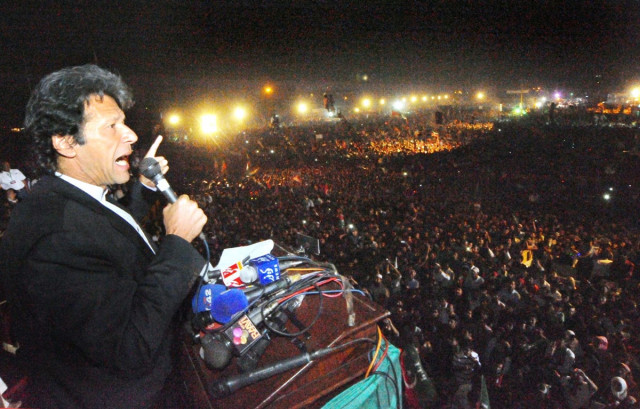The rise of Imran Khan
It will be fair to say that the PTI chief has now arrived as a political force to be reckoned with.

Whatever disagreements one may have with Imran Khan’s ideology or views, one can no longer dismiss Khan and his party as something of an irritant on the national political scene. From now on till the next election is held, he will have to be taken seriously and his party’s electoral fortunes will most probably be far better than they have been in the past — the best being when Mr Khan himself won a seat to the National Assembly from Mianwali in the 2002 elections. It will be fair to say that the PTI chief has now arrived as a political force to be reckoned with. The massive turnout at his party’s rally could, in all likelihood, garner it even more support, given that many voters who sit on the fence and are disillusioned with mainstream parties such as the PPP and the PML-N would have wanted to first wait and see what kind of support Imran Khan would get in his first major rally before throwing in their weight behind him.
So the coming weeks and months could well see some significant defections from some of the bigger parties. The most immediate threat is going to be felt by the PML-N, since the PTI managed to get far more people at its rally compared to the party of the Sharifs, and that too in the latter’s stronghold of Lahore. One would have to see how the ruling party in Punjab responds, but if the provincial law minister is a man of his word he may well have to relinquish his post, since he had said that if the PTI rally attracted more than 50,000 people, he would resign. Other than that, and perhaps it’s a bit early, it remains to be seen how the PML-N responds. The initial reaction has been one of confusion, with senior party leaders clearly put on the defensive by the PTI’s rally and trying to justify their own rally of two days earlier so that the parties now seem to have the same objective: that of ousting the PPP from power.
That said, it is important not to confuse approval of the youthful energy for change that Imran is tapping into with support for his agenda. For one, it is hard to claim to be an agent for complete change when tired has-beens share the same stage as you — many former legislators with not-so-good reputations have joined the PTI in recent weeks. This is a contradiction Imran may never be able to reconcile, especially given his ‘in-100-days-I-will-rid-this-country-of-corruption’ agenda. His only route to power is by playing the same grubby political game as everyone else and making alliances that force you to hold your nose, while at the same time his appeal is based on the fact that he promises to consign the prevailing political forces to the dustbin of history. And it also remains to be seen how many seats his party actually wins since to become prime minister, which surely would be his objective (and the dream of his passionate supporters) after October 30, a party needs to have dozens of candidates capable of winning seats on their own.
Imran’s full-throated declaration that the Baloch will be treated like friends and not colonised was a very welcome sentiment, all the more so given how much speculation there has been that Imran’s recent ascent was the result of support from the establishment. Distancing himself from the army’s Balochistan policy is a good first move for someone who wants to highlight his independence and integrity. Imran also reiterated his support for women and minorities which, when coupled with the fact that he was one of the rare politicians to condemn the murder of Salmaan Taseer, should be viewed with optimism not cynicism.
But those who believe Imran is hopelessly naive would also have felt vindicated after hearing portions of his speech. His stance on the Taliban, although not rising to the level of outright support, is nonetheless very dangerous. He pledged never to use the army to carry out military operations against its own people, and that tribal elders would be able to eliminate the scourge of terrorism if the problem is left to them to deal with. Leave aside the fact that even a personality as strong and charismatic as Imran will never be able to get the army to bend to his will, just the fact that he doesn’t recognise that the Taliban and affiliated groups have spread their tentacles outside of Fata to the rest of the country is reason enough to doubt his judgement. Imran also seems to believe that the singular, transformative act of voting him into power will lead to an immediate end to corruption and that the absence of corruption alone will strengthen our economy to such an extent that there will be no need for us to ask for any foreign aid. Political maturity is a twin process and along with a vote bank Imran Khan will also need to develop a coherent agenda.
Published in The Express Tribune, November 01st, 2011.



















COMMENTS
Comments are moderated and generally will be posted if they are on-topic and not abusive.
For more information, please see our Comments FAQ